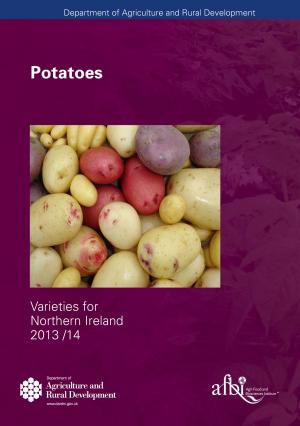Information about varieties in both the booklet and on the AFBI website is based on data collected from trials usually conducted over three years for individual varieties. The most recent harvest year included in this booklet is 2011 with the tubers then stored until 2012. The 100+ varieties included in the booklet are those for which seed is available in the UK and Ireland. All varieties, irrespective of seed availability, which have been in trials for three years during the period 1982-2011, are included on the website.

The Potato Variety Booklet compiled by AFBI on behalf of DARD approximately every two years has been recently updated and published. It has been made available as a pdf on the AFBI website: http://eservices.afbini.gov.uk/recommendedvarieties/potatoes/AFBI-Potato-Varieties-2013-14.pdf.
Revised information on potato varieties has also been uploaded on the
AFBI website: http://eservices.afbini.gov.uk/recommendedvarieties/potatoes/.
A total of 12 new maincrop and two new second early varieties make their appearance in the booklet for the first time, either because they had completed three years of trials or because they were currently in trial.
White and yellow skinned varieties are considered first in alphabetical order, highlighting their positive features. Crisping and chipping quality were assessed only on those varieties with dry matter content of 20% or greater or where the breeder/agent has stated that the variety has potential for processing. Challenger, from HZPC, has light yellow cooked flesh colour and has potential for chipping both after harvest and after storage. Divaa, a second early variety from Caithness Potato Breeders Ltd, with white-cream cooked flesh, has potential for chipping after harvest but is less suitable after storage. Lanorma, from Branston, has cream cooked flesh and is suitable for table use. Olympus, from Higgins Agriculture Ltd, with white-cream cooked flesh, is suitable for crisping and for chipping both after harvest and after storage, but with round tubers will probably only be used for crisping. Richhill, from PPNI, has light yellow cooked flesh and is suitable for table use. Safari, from Greenvale, has yellow cooked flesh and is suitable for table use. Sagitta, a second early from HZPC, has light yellow cooked flesh. Sarpo Gwyn, from the Sarvari Research Trust, has light yellow cooked flesh. Sylvana, from HZPC and Greenvale, has yellow cooked flesh and is suitable for table use.
Blue-skinned varieties are well represented in this year’s newcomers with Blue Belle from Germicopa UK, and Blue Danube from the Sarvari Research Trust. Blue Belle is a part-coloured blue variety with light yellow cooked flesh colour. Blue Danube, with totally blue skin, is white-cream when cooked but is low yielding with small tubers. However it has potential for chipping both after harvest and after storage.
The red-skinned varieties are Mustang from Agrico, Rubesse from Cygnet Potato Breeders Ltd and Sarpo Una from the Sarvari Research Trust. Mustang, with light yellow cooked flesh, has potential for crisping. Rubesse, with yellow cooked flesh, has potential for chipping after harvest but is not so suitable for chipping after storage. Sarpo Una has white-cream cooked flesh but, being susceptible to after-cooking blackening, it may be less suitable for table use.
Two first early varieties appear in the booklet for the first time, Casablanca from Cygnet Potato Breeders Ltd and Vales Emerald from Greenvale AP. Casablanca with white skin and light yellow cooked flesh has potential for early chipping. Vales Emerald has white skin and yellow cooked flesh colour.
Three other varieties, Exquisa, Maritiema and Tulla, have re-entered the booklet, having been included previously but then lapsed as they were not used for seed production in the UK and Ireland.
These new varieties and the many already included in the AFBI Potato Variety Booklet illustrate the wealth of diversity available in potato varieties to growers, pre-packers and processors and, of course, to all of us who enjoy eating potatoes in all their guises. The information provided in the AFBI Booklet is a valuable resource in educating all groups throughout the ‘Supply Chain’ about the wide range of potato varieties.
by Ethel White and Carol Hall, Sustainable Agri-Food Sciences Division, AFBI Plant Testing Station, Crossnacreevy
Notes to editors:
AFBI carries out high quality technology research and development, statutory, analytical, and diagnostic testing functions for DARD and other Government departments, public bodies and commercial companies.
AFBI's Vision is “Scientific excellence in Northern Ireland … serving the world”.
All media enquiries to AFBI Press Office
Latest news
- Open Days at AFBI Hillsborough 17 May 2024
- Soil Health Research to be Featured at AFBI Open Days in June 15 May 2024
- AFBI Open days - Improving the environmental sustainability of dairy farming through improved nutrition 14 May 2024
- AFBI Open days – How to make the most of early life to improve your future dairy herd 07 May 2024
